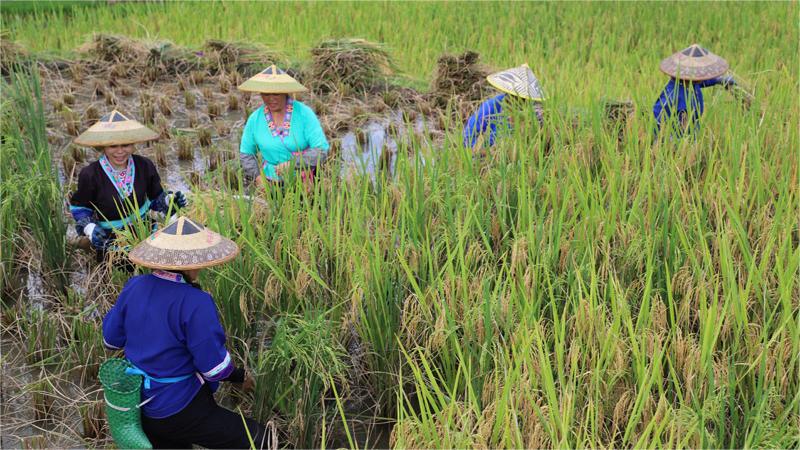FOCAC: A reason for celebration, not skepticism

Workers set up a flower bed to greet the upcoming 2024 FOCAC Summit in Beijing, Aug. 27, 2024. (Photo: China News Service/Jiang Qiming)
From Sept. 4-6, the 2024 Summit of the Forum on China-Africa Cooperation (FOCAC) will be held in Beijing. This will be another reunion of friends as China and Africa leaders gather for the fourth edition of the FOCAC summit, following the 2006 and 2018 Beijing summits, as well as the 2015 Johannesburg summit.
Themed "Joining Hands to Advance Modernization and Build a High-Level China-Africa Community with a Shared Future", it's an event that not just China and Africa should be looking forward to, but something the entire international community can celebrate.
There seems to be a general view in the media that international dealings are a zero-sum game, and mutual benefits or win-win cooperation are unobtainable.
A headline on CNN regarding the 2018 edition of FOCAC is telling: "FOCAC 2018: What does China want from Africa?"
The headline’s focus is on what China hopes to gain from Africa, suggesting a one-sided transaction where China is looking to take from Africa with no mention of what it will be giving back.
Contrary to the headline, the China-Africa relationship is one built on mutually beneficial cooperation and its promise shows how far the world has come. The history of developing countries on their path to modernization is one in which many struggle under the guidance, and at the mercy, of the developed world. History is full of developed countries that at some point took advantage of the stark power difference.
The China-Africa relationship is different as it's a Global South relationship built on a mutual feeling of empathy and understanding that simply isn't possible between Africa and many countries in the developed world. China is the second largest economy in the world today, but the path it has taken to get there is much more similar to that of the countries of Africa than it is to the rest of the world's economies sitting near the top of global rankings.
Today, about 30 countries have achieved modernization with a combined population of 1.2 billion, and the paths they took and the experiences they gained aren't as applicable for countries currently on their development paths. One of the reasons is that the development of already modernized countries occurred in a world where little care was put toward sustainable development, as the world didn't possess the knowledge and science it has today regarding global issues like climate change. Presently, it's a far more difficult path to achieve development thanks to the fact that a country must consider how to achieve economic growth while being mindful of different objectives related to sustainability.
China, with its 1.4 billion people, has taken a new approach towards achieving development through Chinese modernization. While it still draws inspiration from Western models of modernization, it offers new perspectives that are far more useful to the countries of Africa.
It encompasses five key aspects; development of a massive population, common prosperity, material and cultural-ethical progress, environmental harmony, and peaceful development. These key aspects all fall under an overall guiding principle of "people-centered" modernization.
Africa's framework for a modernized Africa, Agenda 2063, includes several guiding "Aspirations" that align very much with the aspects of Chinese modernization.
"Aspiration 1" declares a desire for a prosperous Africa based on inclusive growth and sustainable development, aligning perfectly with Chinese modernization's focus on environmental harmony and common prosperity.
Likewise, "Aspiration 2" states that Africa hopes to achieve an integrated, politically united continent. Given the continent's population of over 1.4 billion people, the modernization of a massive population is very much relevant.
"Aspiration 4" with its commitment to peaceful development and "Aspiration 5" declaring an Africa with shared values and ethics also follow the path set out by Chinese modernization.
Similarly, an overarching theme throughout Agenda 2063 is building a better Africa for its people, just like Chinese modernization's guiding principle of "people-centered" modernization.
With so many similarities, China is a perfect partner for Africa as it continues towards modernization, and FOCAC an ideal platform for the discussions and planning needed to build a "high-level community with a shared future".
The China-Africa relationship may benefit China, but it also benefits Africa and the world. FOCAC is an opportunity to drum up hope for the future, not to be skeptical and questioning of intentions. A world with less poverty and despair is a better world for everyone, and we should together celebrate FOCAC and the benefits it can bring to China, Africa, and the world.
Photos
Related Stories
- China, Africa see greater potential for cooperation in agricultural sector: domestic, foreign experts
- Chadian president arrives in Beijing for 2024 FOCAC summit
- Xi meets DRC president
- Interview: FOCAC summit key means to leverage China-Africa partnership, says consultancy chief
- Explainer: Why Africans won't buy the "Debt Trap" narrative against China
- Xi holds bilateral events with leaders attending FOCAC summit in Beijing
- Lesotho's prime minister arrives in Beijing for 2024 FOCAC summit
- DRC president arrives in Beijing for 2024 FOCAC summit
- President of Seychelles arrives in Beijing for 2024 FOCAC Summit
- Chinese FM meets South African and Senegalese counterparts on China-Africa cooperation
Copyright © 2024 People's Daily Online. All Rights Reserved.









